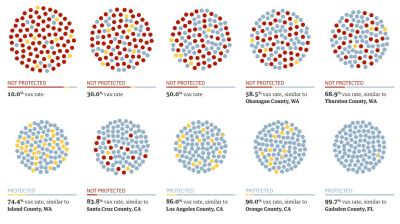The flu kills. In the 2015-2016 season, the flu killed as many as 56,000 people, and as many as 35 million were sickened by it. And with the rise of anti-vaxxers seemingly all over the place, it’s no surprise that so many needlessly fall ill each year.
The San Diego Union-Tribune reported:
An additional 34 deaths were added to the tally Wednesday, including a one-year-old boy, as influenza raged throughout the region in what experts say is the fiercest battle with the rapidly-mutating virus they’ve experienced since 2009, when a pandemic filled emergency rooms from Oceanside to Chula Vista.
“I think we’ve already surpassed what we thought was busy in 2009,” said Michelle Gunnett, director of emergency services at Palomar Medical Center in Escondido, which set up a special flu tent just outside its emergency department entrance over the weekend.
You can find weekly updates on the current flu season on the CDC website.
Influenza isn’t a joke. The flu kills. The young, elderly, pregnant women, and those whose immune system is weakened are by far the most at-risk groups. But that doesn’t mean a healthy, “normal” 20 or 30-something can’t fall dangerously ill with the flu, either. The San Diego Union-Tribune explained the widespread nature of this year’s outbreak:
A staggering number of flu cases — 3,334 — were reported last week, besting the previous week’s total of 2,338, which was itself the highest single-week tally on the books. That’s eight times as many cases as last year.

It’s not the flu, it’s a cold
Undoubtedly a factor in why people don’t take the flu more seriously is how quick people are to claim that they “have the flu.” As this RealClearScience article explains, if you’re feeling bad for a couple of days, no, you probably don’t have the flu:
By definition, “the flu” is an illness caused by an influenza virus. True flu is much less common than a cold and can be a more severe disease – the nasal symptoms are absent but sore throat may be present. You’re likely to be much sicker and have high fever, chills, shaking, severe muscle aches, malaise, headache and a cough.
Influenza may progress to pneumonia and, in the elderly and those with particular chronic conditions, the risk of death is substantial. When a pandemic strain of influenza appears, the mortality in otherwise healthy people may be significant.
If you think you might have the flu, go to a doctor and avoid contact with others.
Flu Vaccine
An important step in dealing with a flu outbreak is prevention. There are many things that you can do to protect yourself and your children – wash your hands, limit contact with others who you think may be ill, and stay home if you think you might be sick. But another preventative step is to get the seasonal flu vaccination.
Flu vaccines are typically free with your insurance, or otherwise cost about $35.That’s a good deal, considering those infected with the flu have a direct cost (hospitalizations and doctor visits) of over $10 billion, not factoring in the personal costs such as time off of work (and probably a lot of Mucinex).
Often times, people don’t receive a flu vaccination likely due to laziness or apathy. After all, the influenza vaccine is only 40-60% effective, so clearly these scientists and doctors don’t really know what they’re doing, right?
Vaccines aren’t 100% perfect. But we can look at simulations based on real outbreaks to see how effective vaccines are at preventing the spread of preventable diseases.

The reason we have seasonal flu vaccines, rather than just one to cover us for a longer period of time, is because the flu mutates. Not only that, but there are multiple strains of the flu present in any given season, so as doctors and scientists manufacture the vaccines, they have to make educated guesses as to which strain will be the “popular” one that season. As the CDC explains:
Each flu season researchers try to determine how well flu vaccines work as a public health intervention. Estimates of how well a flu vaccine works can vary based on study design, outcome(s) measured, population studied and the season in which the flu vaccine was studied. These differences can make it difficult to compare one study’s results with another’s.
While determining how well a flu vaccine works is challenging, in general, recent studies have supported the conclusion that flu vaccination benefits public health, especially when the flu vaccine is well matched to circulating flu viruses.
Even if you’re a healthy Millennial like myself, it’s important to get vaccinated because you can act as an incubator and perpetuate the virus’s existence, passing it on to many others.
TLDR – get your damn flu shot, wash your hands, and stay home if you’re sick.
More reading on the CDC website: https://www.cdc.gov/flu/about/viruses/change.htm






